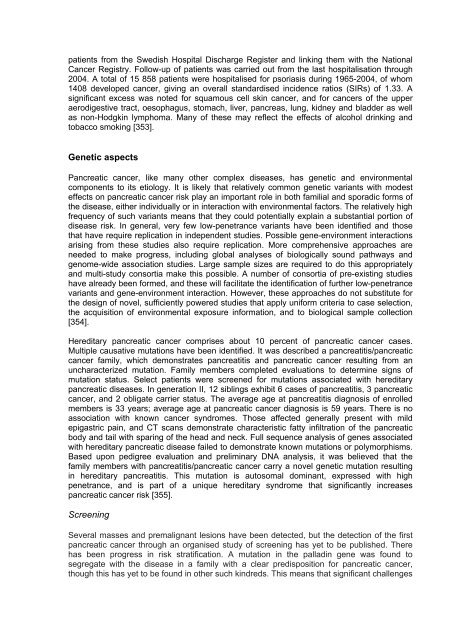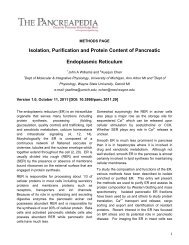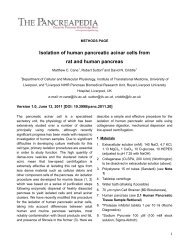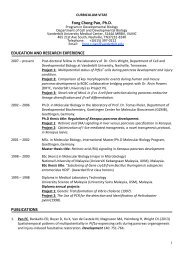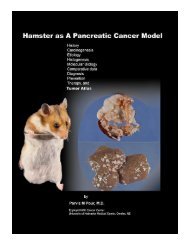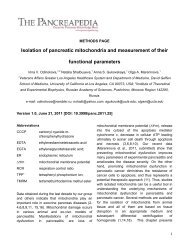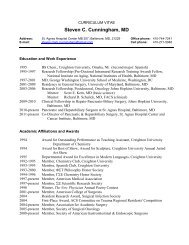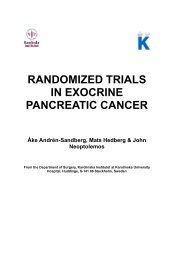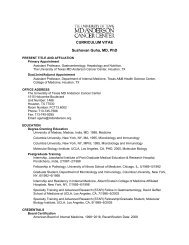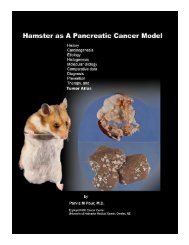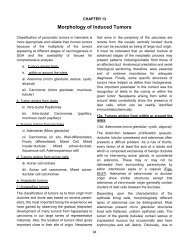review of literature on clinical pancreatology - The Pancreapedia
review of literature on clinical pancreatology - The Pancreapedia
review of literature on clinical pancreatology - The Pancreapedia
You also want an ePaper? Increase the reach of your titles
YUMPU automatically turns print PDFs into web optimized ePapers that Google loves.
patients from the Swedish Hospital Discharge Register and linking them with the Nati<strong>on</strong>alCancer Registry. Follow-up <str<strong>on</strong>g>of</str<strong>on</strong>g> patients was carried out from the last hospitalisati<strong>on</strong> through2004. A total <str<strong>on</strong>g>of</str<strong>on</strong>g> 15 858 patients were hospitalised for psoriasis during 1965-2004, <str<strong>on</strong>g>of</str<strong>on</strong>g> whom1408 developed cancer, giving an overall standardised incidence ratios (SIRs) <str<strong>on</strong>g>of</str<strong>on</strong>g> 1.33. Asignificant excess was noted for squamous cell skin cancer, and for cancers <str<strong>on</strong>g>of</str<strong>on</strong>g> the upperaerodigestive tract, oesophagus, stomach, liver, pancreas, lung, kidney and bladder as wellas n<strong>on</strong>-Hodgkin lymphoma. Many <str<strong>on</strong>g>of</str<strong>on</strong>g> these may reflect the effects <str<strong>on</strong>g>of</str<strong>on</strong>g> alcohol drinking andtobacco smoking [353].Genetic aspectsPancreatic cancer, like many other complex diseases, has genetic and envir<strong>on</strong>mentalcomp<strong>on</strong>ents to its etiology. It is likely that relatively comm<strong>on</strong> genetic variants with modesteffects <strong>on</strong> pancreatic cancer risk play an important role in both familial and sporadic forms <str<strong>on</strong>g>of</str<strong>on</strong>g>the disease, either individually or in interacti<strong>on</strong> with envir<strong>on</strong>mental factors. <strong>The</strong> relatively highfrequency <str<strong>on</strong>g>of</str<strong>on</strong>g> such variants means that they could potentially explain a substantial porti<strong>on</strong> <str<strong>on</strong>g>of</str<strong>on</strong>g>disease risk. In general, very few low-penetrance variants have been identified and thosethat have require replicati<strong>on</strong> in independent studies. Possible gene-envir<strong>on</strong>ment interacti<strong>on</strong>sarising from these studies also require replicati<strong>on</strong>. More comprehensive approaches areneeded to make progress, including global analyses <str<strong>on</strong>g>of</str<strong>on</strong>g> biologically sound pathways andgenome-wide associati<strong>on</strong> studies. Large sample sizes are required to do this appropriatelyand multi-study c<strong>on</strong>sortia make this possible. A number <str<strong>on</strong>g>of</str<strong>on</strong>g> c<strong>on</strong>sortia <str<strong>on</strong>g>of</str<strong>on</strong>g> pre-existing studieshave already been formed, and these will facilitate the identificati<strong>on</strong> <str<strong>on</strong>g>of</str<strong>on</strong>g> further low-penetrancevariants and gene-envir<strong>on</strong>ment interacti<strong>on</strong>. However, these approaches do not substitute forthe design <str<strong>on</strong>g>of</str<strong>on</strong>g> novel, sufficiently powered studies that apply uniform criteria to case selecti<strong>on</strong>,the acquisiti<strong>on</strong> <str<strong>on</strong>g>of</str<strong>on</strong>g> envir<strong>on</strong>mental exposure informati<strong>on</strong>, and to biological sample collecti<strong>on</strong>[354].Hereditary pancreatic cancer comprises about 10 percent <str<strong>on</strong>g>of</str<strong>on</strong>g> pancreatic cancer cases.Multiple causative mutati<strong>on</strong>s have been identified. It was described a pancreatitis/pancreaticcancer family, which dem<strong>on</strong>strates pancreatitis and pancreatic cancer resulting from anuncharacterized mutati<strong>on</strong>. Family members completed evaluati<strong>on</strong>s to determine signs <str<strong>on</strong>g>of</str<strong>on</strong>g>mutati<strong>on</strong> status. Select patients were screened for mutati<strong>on</strong>s associated with hereditarypancreatic diseases. In generati<strong>on</strong> II, 12 siblings exhibit 6 cases <str<strong>on</strong>g>of</str<strong>on</strong>g> pancreatitis, 3 pancreaticcancer, and 2 obligate carrier status. <strong>The</strong> average age at pancreatitis diagnosis <str<strong>on</strong>g>of</str<strong>on</strong>g> enrolledmembers is 33 years; average age at pancreatic cancer diagnosis is 59 years. <strong>The</strong>re is noassociati<strong>on</strong> with known cancer syndromes. Those affected generally present with mildepigastric pain, and CT scans dem<strong>on</strong>strate characteristic fatty infiltrati<strong>on</strong> <str<strong>on</strong>g>of</str<strong>on</strong>g> the pancreaticbody and tail with sparing <str<strong>on</strong>g>of</str<strong>on</strong>g> the head and neck. Full sequence analysis <str<strong>on</strong>g>of</str<strong>on</strong>g> genes associatedwith hereditary pancreatic disease failed to dem<strong>on</strong>strate known mutati<strong>on</strong>s or polymorphisms.Based up<strong>on</strong> pedigree evaluati<strong>on</strong> and preliminary DNA analysis, it was believed that thefamily members with pancreatitis/pancreatic cancer carry a novel genetic mutati<strong>on</strong> resultingin hereditary pancreatitis. This mutati<strong>on</strong> is autosomal dominant, expressed with highpenetrance, and is part <str<strong>on</strong>g>of</str<strong>on</strong>g> a unique hereditary syndrome that significantly increasespancreatic cancer risk [355].ScreeningSeveral masses and premalignant lesi<strong>on</strong>s have been detected, but the detecti<strong>on</strong> <str<strong>on</strong>g>of</str<strong>on</strong>g> the firstpancreatic cancer through an organised study <str<strong>on</strong>g>of</str<strong>on</strong>g> screening has yet to be published. <strong>The</strong>rehas been progress in risk stratificati<strong>on</strong>. A mutati<strong>on</strong> in the palladin gene was found tosegregate with the disease in a family with a clear predispositi<strong>on</strong> for pancreatic cancer,though this has yet to be found in other such kindreds. This means that significant challenges


